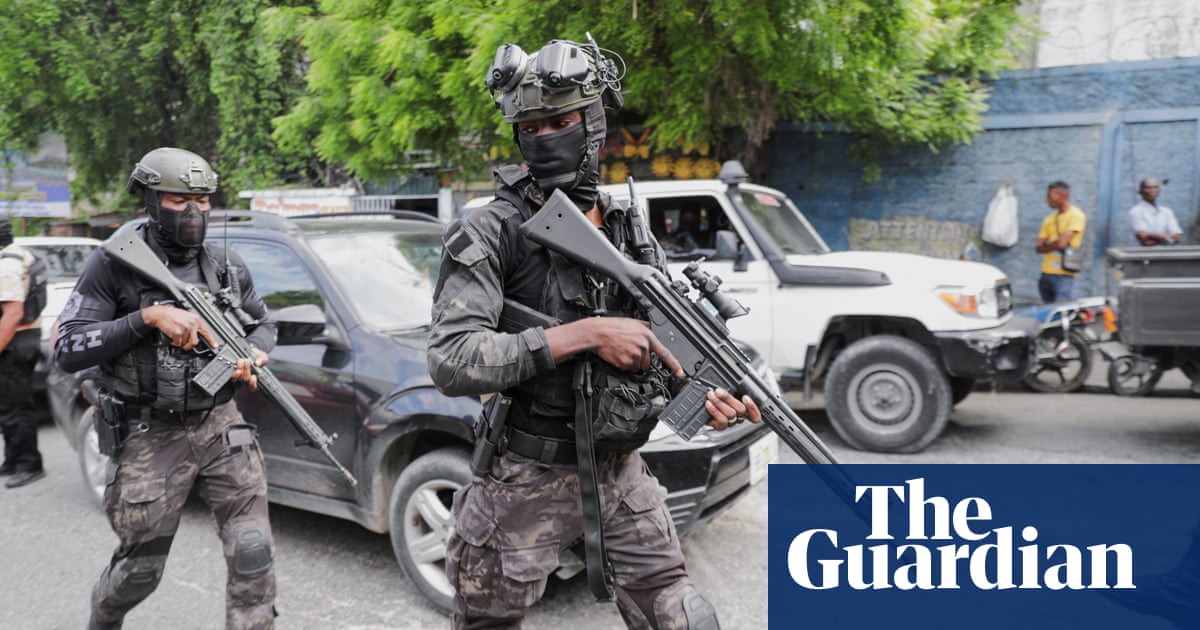
Haiti’s prime minister, Ariel Henry, has formally resigned and a new provisional government has been sworn in during a secret ceremony at the presidential palace, nearly two months after a criminal insurrection plunged the capital into chaos.
The nine-person “transitional council” was officially established on Thursday during an event at the national palace in Port-au-Prince. As its members took their oaths, Henry, who is in the US having been locked out of Haiti by the gang uprising, announced in a letter that he was stepping down.
“We have served the nation during difficult times,” wrote Henry, a neurosurgeon turned politician who came to power after the assassination of President Jovenel Moïse in 2021. Henry had announced last month that he was quitting.
Thursday’s early morning ceremony was cloaked in secrecy and was not publicly announced because of the threat of violence. On the eve of the event, reports suggested it would take place in another government property, a mansion on the outskirts of town.
In recent days there have been shootouts between police and armed criminals in the downtown area around the palace. A prominent gang spokesperson, Jimmy Chérizier, this week warned Haiti’s incoming caretaker leaders to “brace yourselves”.
Despite that threat, the US and 15-member Caribbean Community (Caricom)-backed council pressed on with its inauguration on Thursday, almost two months after the start of the criminal rebellion on 29 February.
Since the coordinated attacks began, Port-au-Prince has in effect been cut off from the outside world, with its international airport and port closed because of gunfights, and the roads linking it to other cities commandeered by armed groups notorious for kidnapping and extortion. Only those wealthy enough to pay thousands of dollars for private helicopter flights – or desperate enough to brave the highways – have been able to get in or out of the capital.
Foreign governments have evacuated hundreds of citizens to the US or the neighbouring Dominican Republic, which shares the island of Hispaniola with Haiti.
An official photograph of Thursday’s ceremony hinted at the strife. The council’s suited members – eight men and a woman – stood on a dais decorated in the country’s red and blue national colours with a police officer wearing a ballistic helmet to their left.
As the councillors, who represent Haiti’s main political parties as well as civil society and faith groups, took their oaths, a military band announced the new leadership with trumpets, tubas and trombones.
Political activists greeted the creation of the council optimistically. Its first task will be to choose a new prime minister before paving the way for elections.
At a second ceremony marking the establishment of the council, the recently appointed US ambassador to Haiti, Dennis Hankins, said he hoped his country could help Haiti return to a path of stability, democracy and economic growth.
“Each day is a new day and this is a new day for Haiti,” Hankins said. “The parties representing really the entire range of Haitian society have shown their ability to go past their personal or party interests to work together in favour of the Haitian people. So it is an important step today. In crisis the Haitians are able to do tremendous things and we’re here to help them. We won’t be the solution but hopefully we’ll be part of helping those finding the solution.”
Hankins recognised that the US was partly responsible for Haiti’s current drama, given the large number of weapons flowing into the hands of Haiti’s gangs from the US. “The fact that many of the arms that come here come from the United States I think is indisputable and that has a direct impact [here],” admitted the ambassador, who said he believed his government was now working to limit the export of such firearms.
Haiti, which is still recovering from a devastating 2010 earthquake that levelled the capital and killed tens of thousands of people, has no elected officials and has not held an election since 2016. Armed groups are said to control at least 80% of the capital, with outgunned police fighting to keep the politically connected gangs at bay.
More than 50,000 people have been displaced by the violence, with at least 2,500 people killed or injured since the start of the year and 1.6 million people on the brink of famine.